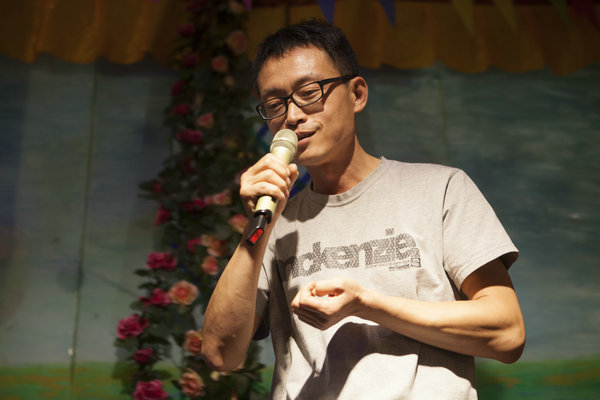A quest for laughs and the accolade of self-worth
By Tang Yue ( China Daily ) Updated: 2015-10-31 08:27:47
For much of Shen Weijian's five minutes on stage, his eyes look straight toward the floor rather than at the audience, his delivery is slow and his hands tremble incessantly.
Shen, 42, a dishwasher, is giving his second performance at a stand-up comedy open mic session and, despite the obvious nerves, he receives a few rounds of laughter.
"I didn't have a strong enough presence and my voice was too low," Shen says, running a rule over this performance in September. "But at least it was much better than the first time, and I reckon that with more practice I'll be even better next time."
For most Chinese, stand-up comedy was virtually unknown before 2010 when video of Joe Wong, a Chinese American comedian performing at the annual dinner hosted by the Radio and Television Correspondents' Association of the United States and making fun of the US vice-president Joe Biden became a hit on the Internet.
Five years later, stand-up comedy is part of the entertainment in a few pubs in Beijing, Shanghai and Shenzhen and is increasingly performed in some theaters.
The kind of people who perform and watch stand-up comedy has also broadened, from white-collar workers to other social strata.
Shen's performance in September was in the Sanlitun area of Beijing, two hours by public transport from where he lives on the outskirts of the capital, so after the show he had to make a beeline for the nearest subway station to ensure that he would not miss the last bus connection.
He works from 10 am to 3 pm, with only two days off a month, and is paid 1,800 yuan ($285) a month, he says.
He has traveled to Sanlitun after work once a month since July. Admission to the open mic sessions is free, although performers are asked to buy a drink as a quid pro quo for being given use of the venue.
|
|
|
|
|
|
|
|


























 Raymond Zhou:
Raymond Zhou: Pauline D Loh:
Pauline D Loh: Hot Pot
Hot Pot Eco China
Eco China China Dream
China Dream China Face
China Face






